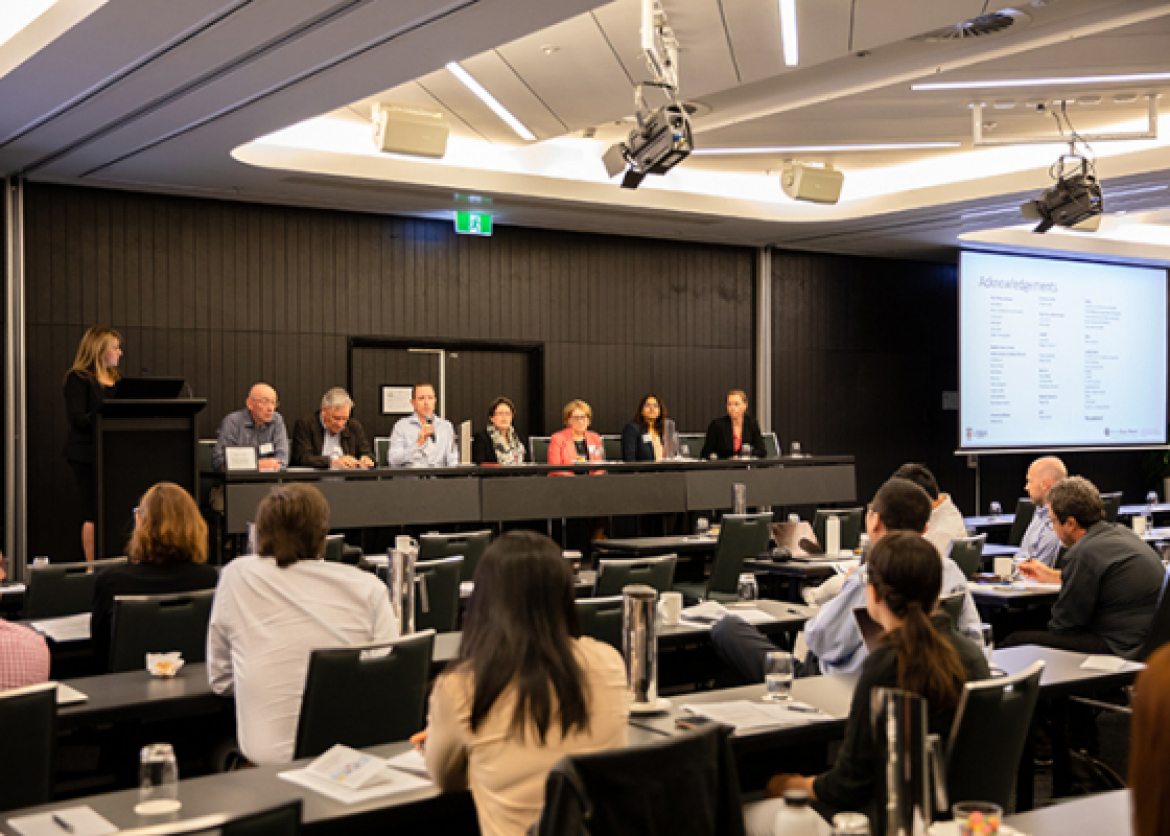
At a recent Therapeutic Development Workshop, experts shared perspectives on the challenges of moving a therapy from basic research discovery to the clinic - exploring all stages of therapeutic development
Led by UNSW Medicine and funded by the Cancer Theme(link is external) (and Maridulu Budyari Gumal (SPHERE) Cancer CAG(link is external)), the Therapeutic Development workshop enabled experts across all steps of drug development and the SPHERE partnership to explore ideas around commercialising research into treatments, therapies or drugs to improve health across the community.
Nearly one hundred people came together to learn about developing and testing novel therapeutics. The workshop featured a line-up of expert speakers and panel members from across the SPHERE network. The workshop brought together experts across all the steps of the process: institutes, hospitals, universities, senior and junior researchers as well as PhD students.
Associate Professors Jeff Holst and Phoebe Phillips organised the workshop and convened it on the day.
“Our first drug development workshop was a huge success and is the first of many important workshops to develop and strengthen UNSW’s capacity to translate a basic discovery from the lab bench to the patient,” said Associate Professor Phillips, Head of the Pancreatic Cancer Translational Research Group.
“A key strength of our day was bringing together experts from across the SPHERE partnerships, government, and industry representatives. It is together through rigorous discussion and collaboration that we learn from our successes and failures and this will increase our ability to positively impact health and economic outcomes through drug development.”
As leader of the Translational Cancer Metabolism Laboratory in the Adult Cancer Program, Associate Professor Holst agreed,
“It is essential as researchers that we engage early on with multidisciplinary researchers, clinicians and patients to understand the unmet needs for drug development,’ he explained, “The take home message reiterated by many speakers was that we need to fail fast by doing the right commercial grade assays early in our drug development pipeline. This will save time and money and ensure we develop the best drug candidate.”
Feedback from the event was overwhelmingly positive. Those who attended enjoyed listening to the breadth of knowledge and experience, finding discussion relevant and stimulating. Presentations included real-life experiences and showcased different perspectives. The event allowed participants the opportunity to network and look at collaborative opportunities available across SPHERE partner organisations.
Topics covered on the day included:
• Target identification and validation
• Laboratory and preclinical models
• Companion biomarkers including 'omics
• High throughput assay and drug screening
• Medicinal chemistry
• Start-up company and seed funding
• Intellectual property and commercialisation
• Regulatory processes
• Early Phase clinical trials
As organisers, Associate Professors Phillips and Holst are committed to continuing the conversation.
“Jeff and I were both really pleased to see enthusiastic audience members representing all career stages, interdisciplinary expertise (chemists, biologists, clinicians, lawyers, engineers) and SPHERE partnerships,” said Associate Professor Phillips, “This is the start of something special and we will bottle the outcomes and recommendations for ongoing use as educational resources to be shared.”
Resources will be made widely available to assist those interested in therapeutic development. The Cancer Theme and SPHERE Cancer CAG thanks everyone who participated as well as Associate Professor Greg Arndt (Children’s Cancer Institute) and Dr Stephen Palmer (UNSW Knowledge Exchange) who contributed to the successful program and the Translational Cancer Research Network(link is external) and UNSW Knowledge Exchange(link is external) for supporting this event
If you wish to join the Therapeutic Development Special Interest Group, please sign up here(link is external).
